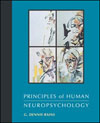Late in his life, the 20th-century French composer Maurice Ravel, the creator of marvelously original impressionistic music and one of the most brilliant orchestrators in the history of Western music, began to experience symptoms of a brain tumor that eventually killed him. He describes awakening one morning and finding to his distress that he had forgotten how to tie his necktie. It wasn't that he had lost the strength or dexterity necessary to perform the individual component movements; rather, it seemed that he had forgotten the sequence of movements, so often performed in the past, necessary to accomplish the task. He had, strangely, forgotten what to do. This symptom picture, which so frightened Ravel, is an example of a disorder termed apraxia. Although there are different types, apraxia can generally be defined as a disorder of learned movement not due to peripheral paralysis, weakness, loss of dexterity, sensory loss, or the effects of other impairments such as aphasia, dementia, or a psychiatric disorder. In other words, apraxia is a disorder of the execution of complex movements, which are generally termed voluntary, in the absence of primary motor or sensory impairment, general intellectual impairment, or a psychiatric disorder. We will have more to say about apraxia in subsequent sections of this chapter. |



 2002 McGraw-Hill Higher Education
2002 McGraw-Hill Higher Education